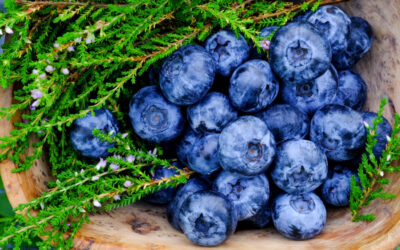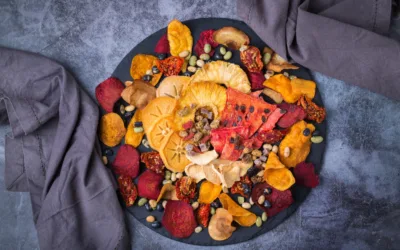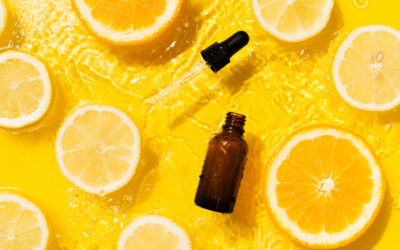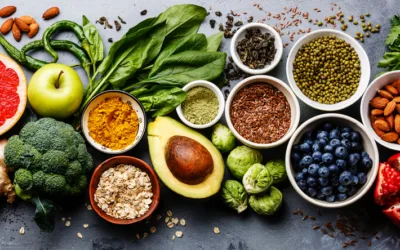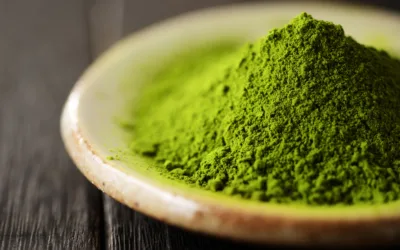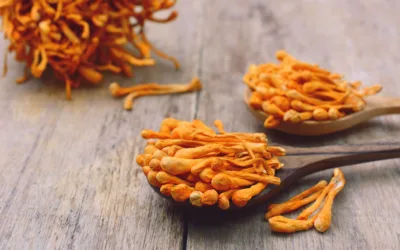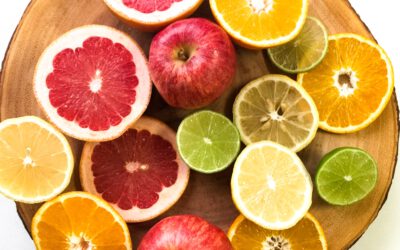Is Honey a Superfood?
Honey has long been used as an ingredient in natural healing remedies. In fact, the earliest reference to honey dates back 8,000 years ago to a cave painting in Spain. Honey has long been used in old folk remedies because it contains a wide variety of powerful antioxidants known as polyphenols that can exert several health-beneficial effects including anti-inflammatory, antibacterial, antidiabetic, respiratory and gastrointestinal healing, as well as cardiovascular and nervous system protective effects, as illustrated in this medical journal: https://www.ncbi.nlm.nih.gov/pmc/articles/PMC3609166/
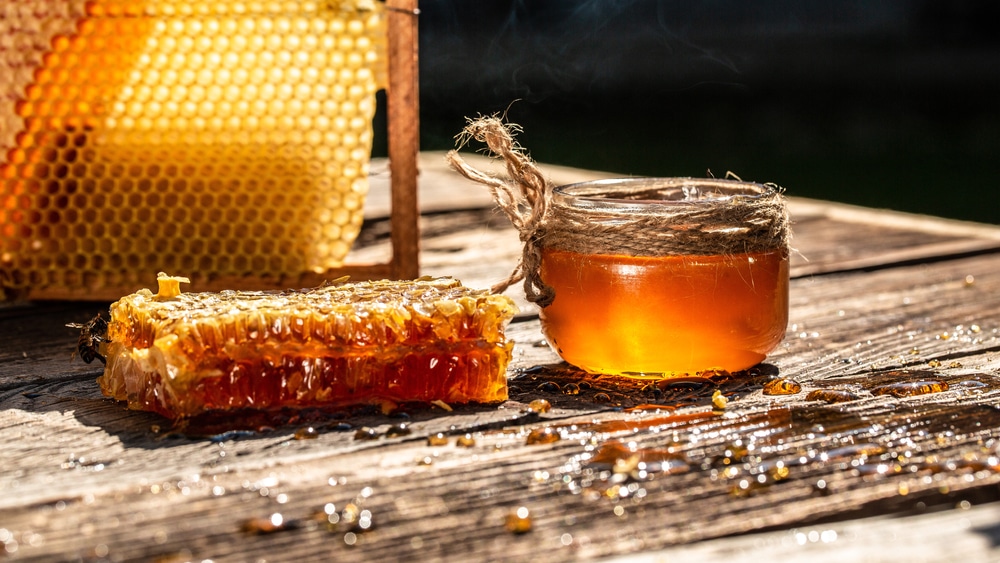
I remember growing up in Georgia, anytime I got sick my grandmother would make me a hot cup of water with a tablespoon of honey and a teaspoon of moonshine. Moonshine, like brandy, has antimicrobial properties that can thin the mucus that builds up during the night when we have a cold. It did the trick every time, though I am certainly not encouraging you to feed you or your kiddos moonshine! A tablespoon of honey and some lemon will do…
In my functional medicine health coaching clinic I always encourage my patients to switch their white table sugar for raw honey because of these particular health benefits. It’s a superfood. And now when I bake, I always replace any call for sugar with honey.
Benefits of honey
When you really break down the nutritional profile of raw honey you’ll be amazed at all the potency hiding in this common staple, such as:
- Vitamins A, D, E, and K
- B vitamins – B6, niacin, riboflavin, thiamin
- Minerals – Calcium, copper, iron, magnesium, potassium, zinc, and the list goes on.
- PLUS 22 amino acids!!
Because of its nutrient-density, honey has been shown to be an excellent remedy for a variety of health problems, including:
1. WOUND HEALING
Due to its intensive antimicrobial properties, raw honey has been shown to be an effective alternative to conventional antimicrobial medications for everything from burns, scratches, boils, and septic wounds.
2. COLD PREVENTION + HEALING
Honey’s antimicrobial benefits shine once again when it comes to fighting off infections. In fact, honey has been found to significantly improve symptoms of upper respiratory infections, even in cases of antibiotic resistance.
3. ALLERGY RELIEF
Multiple studies have linked honey with its ability to improve seasonal allergies and other allergic diseases like asthma and atopic dermatitis – in some cases even more so than with medication alone. My son has big skin allergies to mosquito bites and I always use honey + tea tree oil as a poultice and the itching and swelling almost immediately goes down.
4. DIGESTIVE AID
According to a recent 2022 study published in Frontiers in Nutrition, raw honey’s prebiotic content can help improve microbiome diversity by increasing the population of beneficial bacteria like Lactobacillus and Bifidobacteria. But that’s not all – the study also found these same properties could kill off pathogenic bacteria in your microbiome including Salmonella, Escherichia coli, and Clostridium difficile.
Home Remedies With Honey
1. Bladder Infection
Everyone’s heard of good ‘ole cranberry juice, but did you know honey actually contains a natural hydrogen peroxide? Honey has antibacterial properties that can effectively treat mild bladder infections.
Makes: 1 dose – Take 1 dose every 6 hours
- 1 TBSP Honey
- ¾ Cup Boiled Water
- 1 TSP Ground Cinnamon
Add the honey to the water and stir until it dissolves. Then add the cinnamon and stir again.
2. Cold, cough relief
Eating a teaspoon of honey a day will definitely support your body’s immune system, but on the off chance you do catch a cold, pairing honey with lemon and herbs makes the perfect natural remedy that your sick body needs. Not only will it relieve your symptoms, but it will aid in sleep as well.
Makes: 1 cup of tea
- 2 Sage Leaves
- Small Sprig of Rosemary
- 2 Lemon Slices, Plus an extra for your cup
- 1 ¼ cup of boiling water
- 1-2 Teaspoons of Honey
In a mug, crush the sage, rosemary and 2 lemon slices. Then cover with the boiling water. Stir in the honey and steep for 2 minutes. Strain tea into a fresh mug, add the last lemon slice, and enjoy!
3. Stomach ulcer cure
Mix 2 Tbsp honey with 10 ml warm water and have it before meals.
4. Control Psoriasis
Topical application of mixture of beeswax, honey and olive oil.
5. Appetite improvement
Take a pinch of black pepper with a tablespoon of pure honey.
6. Prevent bleeding gums
Apply a paste made of honey, ginger, ghee, black pepper powder and rock salt.
7. Sleeping Aid due to coughing
Honey can also help if you need a sleep aid due to coughing. This recipe does contain alcohol. To make a child’s toddy, replace the whiskey or brandy with 1 teaspoon of lemon juice.
Makes: 1 Toddy
- 2 Teaspoons of Honey
- ⅔ Cup Boiling Water
- 2 Tablespoons of Whiskey or Brandy
- 1 Cinnamon Stick
- 1 Thick Lemon Slice
- Freshly Grated Nutmeg
Stir your favorite variety of honey in the boiling water until it dissolves. Add the whiskey, lemon slice, and cinnamon stick. Leave for 2-3 minutes, then remove the cinnamon stick and the lemon slice. Sprinkle with the nutmeg and serve.
8. Insect Bites
For each bite, use a ¼ tsp honey with 2 drops of tea tree oil
What type of honey should I get?
You may have heard of “raw honey” and wondered how it differs from the honey in the cute little bear bottles at the store. Well honey can come in two forms – raw or pasteurized. Due to the fact that it is not processed, raw honey still contains bee pollen, which is what boosts immune system function. Pasteurized honey, on the other hand, has been processed to help remove any potential bacteria, but in doing so, also removes its potent nutritional value. So the cheap honey in the squeeze bottle doesn’t have any healing properties to speak of and, unfortunately, it doesn’t do much more than act as a sweetener.
There are multiple varieties of honey depending on the plant source and each plant variety provides a different flavor profile. There are over 300 different types, in fact and the darker the honey the deeper and more intense its flavor is going to be. From these 300 varieties, there is one that is particularly noteworthy: Manuka. It is only produced in New Zealand from pollination of the Manuka bush. It is a dark color with a deeper, more earthy-sweet flavor. Manuka honey’s nutritional profile far outshines the health benefits of its sibling, ‘normal’ honey. Unfortunately, you see this in the prices of Manuka, but if you are willing to invest, your body will love you for it.
The antibacterial and antimicrobial qualities in Manuka honey are intensified so much more and research has shown it is powerful enough to heal intensive injuries such as burns and infected wounds as well as fight off pathogens such as E. Coli, Salmonella, and even S. aureus, which is better known as MRSA.
Because Manuka honey is so valuable, New Zealand has come up with its own system for assuring the quality of Manuka honey being sold. They have a grading system that looks at the natural antibacterial properties such as, leptosperin, methylglyoxal, and DHA, in Manuka to rate its quality. When buying Manuka honey you’ll want to look for the UMF symbol along with an accompanying number. A rating between 10-15 is very standard for antibacterial benefits with anything above that providing the most intensive antibacterial properties for Manuka. Anything less than 5 won’t provide the same level of health benefits.
One of the best ways to use Manuka is to use it with matcha green tea because the EGCG in matcha + the antioxidants in Manuka are a power combo. So if you are looking for an all-natural healing remedy you can rely on, give Manuka honey a try.
How much raw honey should I eat everyday?
Is raw honey good for you? Yes! But there is a slight caveat. Although honey is a more natural alternative for a sweetener, the body still processes it mostly the same as sugar. Therefore, it is best not to overdo any kind of honey intake on a daily basis. Keeping a limit of 1-2 Tablespoons each day will help you get an appropriate amount of the benefits of raw honey, but not too much that it’s giving you sweetness overload.
While honey is a fantastic support for those trying to reach wellness goals, it is important to remember that it likely won’t completely solve the overarching health issues you are facing all on its own. It’s important to discover the root cause of the symptoms that have piqued your interest in these honey benefits, so that you can pair this superfood with other more effective treatment methods.
Note: The American Academy of Pediatrics cautions parents of children under the age of 12 months. Their underdeveloped immune systems leave them vulnerable to botulism, a serious form of food poisoning. Dirt and dust containing botulism bacteria spores can creep into honey and wreak havoc on little tummies. Best to steer clear until their first birthday.
More from Nutrition
How To Avoid The Blood Sugar Highs and Lows
How To Balance Blood Sugar Over the Holidays According to the CDC, about 33.9% of adults in the U.S. (that’s more than 84 million people) have pre-diabetes. What’s even more shocking is that only one-third of them know they have it. Many of us don’t think about...
What are polyphenols, and how can they affect your health?
The Magical Power of Polyphenols Polyphenols are magical little compounds found largely in fruits, vegetables, tea, coffee, and cocoa. There are over 8000 polyphenols identified in nature and they are what we know of as antioxidants. They are basically the...
Preserving the Harvest: The Art of Dehydrating Fruits and Vegetables
The Art of Dehydrating Fruits and VegetablesPicture this: vibrant fruits and vegetables bursting with flavor and harvested at the peak of their freshness. Now, imagine savoring those same flavors and nutrients months later, long after the growing season has ended....
The Most Important Vitamin for Your Skin
The Most Important Vitamin for Your SkinThese days there are new cosmetic lines popping up everywhere touting the best new anti-aging technology. With such a flooded market, it is often hard to know which way to turn. Which one works the best? The most expensive one?...
How to Eat for a Long Life
How to Eat for a Long Life If you’ve ever wondered how to eat for longevity, then listen up because I’m going to tell you about what I learned from my education, research, and personal experience eating my way back to health over the past seven years. I was...
Matcha, the Beyonce of Tea
You are either already a matcha aficionado like myself, or else you’ve gotten wind of its magical superpowers. To be honest, its superstar hype should come as no surprise because, quite frankly, matcha can out-twerk any other tea, any day of the week.
Chickpeas, Goats and Wine
Chickpeas, Goats, and Sardinian Cannonau wine When it comes to the Sardinians, genetics, lifestyle and diet come together to create a loooooooong life. Sardinia is in one of the Blue Zones, with the world’s longest living people. There are a few things that factor...
Frankincense and Myrrh
Medicinal Qualities of Frankincense and MyrrhTurns out those three wise men were pretty wise afterall. It wasn’t an uninspired choice to include the two plant oils, frankincense and myrrh, with gold to bring to newborn Jesus. Gold, circa 5 BC, seems reasonable. But...
Adaptogenic Mushrooms
Adaptogenic MushroomsWe all know what a mushroom is, but what makes specific ones adaptogenic? Well, there are certain species that fit a special category of herbs that have medicinal compounds called adaptogens. This means they help your body deal with the negative...
My Top 7 Power Foods
Fermented foods / ProbioticsI have a few friends that are probably rolling their eyes way back in their heads right now because they’ve heard this from me so many times - but guys - this can be a game changer for your health. If you aren’t already on the probiotic...


